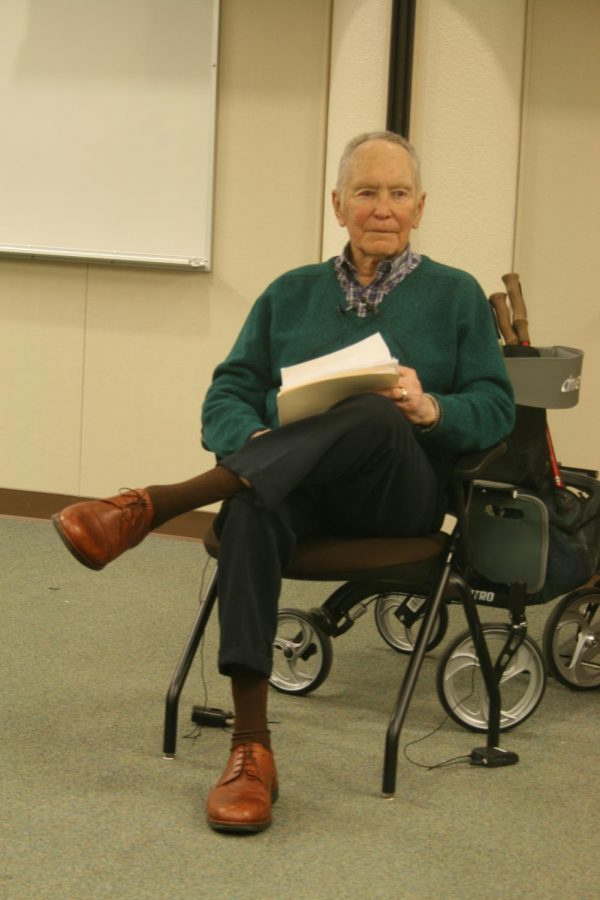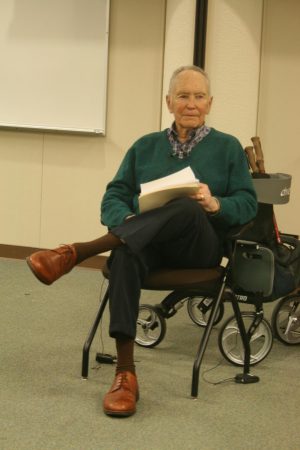Bakersfield writer Gerald Haslam speaks at Levan Center

Gerald Haslam during his Nov. 30 at Bakersfield College
December 8, 2017

Gerald Haslam during his Nov. 30 at Bakersfield College
Author Gerald Haslam of Sonoma State University, a native of Bakersfield and alumnus of Bakersfield College has written extensively about the diverse people of Kern County and the central valley. On Nov. 30, he talked about what he had observed during his lifetime, at Homecoming: An Evening with Gerald Haslam at the Levan Center for the inaugural opening of the National Endowment for Humanities grant “Energizing Humanities in California’s San Joaquin Valley.”
The directors of the grant program, History professor Oliver Rosales, English professor Andrew Bond, and Professor of Commercial Music Josh Ottum, coordinated the event.
Bond attended the event via live-stream with his students from Arvin, while Rosales read a prepared statement from Bond. Bond praised Haslam’s work, stating that it, “best embodied the diversity of the region and the interdisciplinary nature,” of the grant program.
He also said, “It is the connections that he [Haslam] makes between the importance of place, narrative and history, that from our perspective as faculty, make him an ideal candidate to inaugurate our grant programming.”
This was the third time that Haslam has been a keynote speaker at the Levan Center, according to the center director, Jack Hernandez, which is what made it “a very special night.”
Haslam opened with, “It’s place that writes your books,” a borrowed line, according to Haslam, by Sioux land novelist Frederick Manfred, whom Haslam at one point in his writing career found Manfred’s claim a bit “overarching.”
Haslam eventually came to regard Manfred’s words as very relevant to his own career, when he began writing about the place he calls home and became a published author.
During the presentation Haslam covered his academic pursuits, his thoughts on being a published writer, some of the failures he faced, the successes he accomplished, and how his notebooks played an integral role to his success after his service in the army as a journalist. He talked about his diligent pursuit to publish the stories he wrote, despite the ongoing pushback from editors about the narratives of a dusty soil town, its people and their lifestyles.
“… I realized that for me at least, this county, this valley, and this city, had been a remarkably special place. It’s been like the Australian novelist Judith Wright calls ‘My Blood’s Country.’
With such a “valley-centric perspective … employing hyperbole against hyperbole,” Haslam said he didn’t make any friends in the Bay area or Los Angeles, which was counter to his desire at the time as a writer.
Haslam invested a lot of time into becoming a writer. He carried notebooks with him wherever he went, and jotted down lines from conversations with family, colleagues and strangers, believing the contents of his notebooks would prove valuable somehow as a writer someday. His life in the valley, and beyond, gave fuel for his storytelling inventions that would eventually be discovered in the most fortuitous of ways.
A lucky break came for Haslam when a student of James D. Houston, a famous novelist, and professor at UC Santa Cruz, gave one of Haslam’s books to Houston. Haslam said, “He read it and liked it. He wanted to get to be friends … to my great pleasure he became my best friend …” They would eventually co-author a book together, California Heartland: Writing form the Great Central Valley.
Haslam was also contacted by Terry McWilliams who reviewed Okies Collected Stories and he offered Haslam a job at The Nation. Another lucky break would launch him into the world of academia. His former BC professor Dorothy Overly, was appointed as Department Chair at Sonoma State University and hired Haslam on the promise that he would finish his doctorate degree. He eventually did, but said by the time he finished, it was of no real consequence. He had already established himself as a successful writer.
“Serendipity played a tremendous role in my success …,” Haslam said.
If not for the luck and timing, and the role that people like James Houston and Terry McWilliams and others had played in his life,“… I might be at the Tejon Club scrawling on the walls, there in Oildale, said Haslam.”
Haslam also paid tribute to Bakersfield writers Robert Duncan and Frankie Bidart and Merle Haggard, Buttonwillow’s Don Thompson and Central Valley’s Joyce Carol Thomas, David mas Masumoto, Ernesto Trejo and Jon Veinberg.
Haslam did have some hopeful advice for those budding writers who attended his presentation. He told them to pay attention and observe the world around them. Keep a notebook and write down observations. “Writers steal largely by observing closely …” he said.
Writing takes breaks, luck, and talent. “If you’re sending in your manuscript, don’t beat yourself up, because someone’s not accepting it,” he said.
Although Haslam failed “many, many, many times,” he said, “I kept on plugging away. Kind of rolled with the punches and learned from my mistakes and that’s what I tell young writers. Don’t quit. Learn from mistakes. Learning from mistakes really are mistakes.”
Haslam also said, “Don’t take things for granted. Anything might be a story. Anything might be a poem. Anything might be a play. You just have to learn how to see it. See what’s there. See what the possibilities are.”





